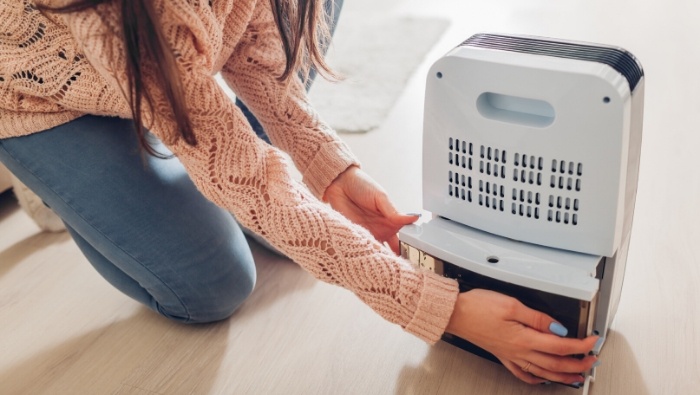Is Too Much Moisture in Your Home Costing You?

Moisture could be causing damage to your home (and your health!) without you realizing it. We demystify dehumidifiers while exploring sources of humidity that could be damaging your home and health and costing you money.
This is no time to be cheap! Run over to one of the big box stores such as Lowe’s, and for under $10, you can buy a hygrometer for every room in the house, including the basement, to keep a close watch on humidity levels inside your home. This little device works and looks like a thermometer but measures humidity rather than temperature.
The Damage Humidity Can Do
Above-average humidity in your home can affect your health and do permanent damage to your home. According to MarthaStewart.com, 30% to 50% is the recommended humidity level within your house. If it is humid outdoors, however tight your house is, you can expect higher humidity levels indoors.
A house that is consistently too humid can cause mildew and mold to develop and can ultimately rot wood. This is especially true in wood that is hidden, such as in the crawl space under your home. Wood moldings, baseboards and wood floors can retain water from the air and ultimately warp.
The health of your family can be negatively impacted by a house with humidity levels that are consistently too high. Sleeping can be more difficult in a bedroom that is too humid, according to Sleep.org. Depression is sometimes even a side effect. Don’t worry about the frizzier-than-usual hair from being in a too-humid home. You should be more concerned about the stuffy air leading to more colds and other respiratory problems.
Sign Up for Savings
Subscribe to get money-saving content by email that can help you stretch your dollars further.
Twice each week, you'll receive articles and tips that can help you free up and keep more of your hard-earned money, even on the tightest of budgets.
We respect your privacy. Unsubscribe at any time.
Why Is Your House So Humid Inside?
Humidity in the house can fluctuate greatly within the course of a day.
Long steamy showers can temporarily raise levels. A dryer that doesn’t vent to the outdoors can keep moisture in the house, as does hanging wet clothes in a laundry room, bathroom, or bedroom. Cooking food in pots without lids can even increase humidity. It surprises many people to hear that human beings emit moisture, which contributes to moisture in the air of your house.
To see for yourself, measure the humidity in your home before and immediately after you have had a house full of visitors!
How Can You Lower the Humidity Inside Your Home?
Paying attention to some of the easy-to-resolve issues mentioned above is your first line of defense against a too-humid house.
Opening windows can help, as long as the humidity outside is lower than the humidity inside. Exhaust fans located in strategic spots can also help circulate and dry out air. If you are running your air conditioning in the summer a bit more than usual, then perhaps a dehumidifier is your best option for keeping things dry enough in the house.
Dehumidifier Costs
Dehumidifiers can get pricey in cost and utility usage as you add more features.
The size of the dehumidifier determines the square or cubic footage of space it will maintain at desired humidity levels. A very small machine may cost around $75 to $150, but it will only work in a small room like a tiny bedroom, bathroom, or closet. It may ultimately be more cost-effective to go with a larger dehumidifier for a few hundred dollars to impact larger parts of the house.
Important Factors To Consider When Buying a Dehumidifier
Where to use the dehumidifier and how to drain it are two important factors to consider before purchasing one.
The cheaper dehumidifiers typically do not have drainage systems. Therefore, the water will need to be frequently emptied manually by you.
If you spend a bit more, you can buy one that drains, but then you still need to figure out where you want it to drain. For example, a dehumidifier that comes with a draining system that will go in your bedroom with an attached bathroom could possibly drain into the shower drain if you can position things just right.
An entire house dehumidifier, costing $900 or more, can be set in the basement or crawl space and hooked right into the drainage system and even the sump pump for easy self-draining.
Eliminate all obvious sources of humidity in your house before beginning a serious search for a dehumidifier. Only then consider which dehumidifier would be best for your home.
Reviewed October 2023
Wouldn't you like to be a Stretcher too?
Subscribe to get our money-saving content twice per week by email and start living better for less.
We respect your privacy. Unsubscribe at any time.
Popular Articles
On After50Finances.com
- 9 Things You Need to Do Before You Retire
- You Didn’t Save Enough for Retirement and You’re 55+
- When Empty Nesters Reorganize and Declutter Their Home
- Reinventing Your Career in Your 50s or 60s
- What Mature Homeowners Should Know about Reverse Mortgages
- 2 Reasons to Collect Social Security Benefits As Soon As Possible

